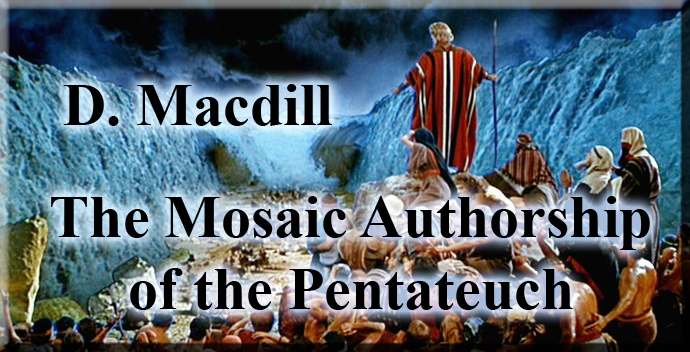
The Mosaic Authorship of the Pentateuch
By D. Macdill
Part III - Internal Evidence
Chapter 10
|
ARGUMENT FROM SILENCE The analytics claim that Judges, Samuel, the Psalms, Proverbs, and other succeeding books are silent in regard to the Pentateuch, and they argue that therefore these books came into existence before the Pentateuch. We will endeavor to show farther on that the historical, poetic, and prophetic books are not silent in regard to the Pentateuch, but do recognize its existence in various ways. The argument from silence may, however, be employed more effectively on the other side. The Pentateuch does not mention, quote, or allude to, nor in any way indicate, suggest, or recognize any other book of the Bible. The Pentateuch, therefore, must have preceded all the other books of the Bible. It is silent in regard to Hosea, Jeremiah, and Isaiah, and it must, therefore, have been written before their time. It makes no allusion to any of the Psalms, and, therefore, it preceded even the Davidic Psalms. Neither does the Pentateuch in any way allude to or recognize the books of Samuel, Judges, or Joshua. It is, therefore, of earlier date than any of these books. This reasoning would be entirely conclusive, provided silence of one book concerning another were proof of prior existence, which it is not; for many an author has no occasion to mention contemporary or preceding authors. But if the Pentateuchal books were produced in the exilic age or post-exilic age, their silence in regard to many preceding persons and events is unaccountable. These books are absolutely silent in regard to the whole Jewish history from the exile back to the death and burial of Moses. In all these five books there is not a word about the establishment of the monarchy, the division of the nation into two kingdoms, the destruction of the ten tribes, the exile, or any other event in that long period of more than nine hundred years; not one word about Saul, David, Solomon, or any other king; not one word about Samuel, Elijah, Isaiah, or any other prophet; not one word even about the temple, with its beauty and its priestly service. Silence in regard to all these persons and all these events so dear to the pride and patriotism and piety of the Jewish heart! It is questionable whether such a silence was psychologically possible on the part of Jewish authors living at or after the time of the exile. It is certain that this silence is very improbable and altogether unaccountable. This silence becomes still more enigmatical and improbable when viewed in connection with the hypotheses of the analysts concerning the origin of the Pentateuchal books. They suppose that Deuteronomy was written near the close of the monarchy, in the time of Manasseh, probably about 650 B.C. They suppose, further, that the other four books were written, or in some way gotten up, during the exile in Babylonia. And still further, they suppose that in these Pentateuchal books are embraced the writings, or extracts from the writings, of an unknown author, E, who lived 800 B.C., and of another unknown author, J, who lived 900 B.C. They suppose, too, that a host of writers, compilers, redactors, and interpolators, living in exilic times, worked on the Pentateuch. Yet, according to these hypotheses, not one of these many authors, compilers, redactors, and interpolators made any allusion to his own times or country, or in any way indicated when or where he lived, or, indeed, whether he lived at all, or in any way betrayed his knowledge of any event in Jewish history after the crossing of the Jordan to conquer Canaan; or, if the Pentateuch did originally contain any such allusions or suggestions, they were all carefully weeded out by designing redactors. The intention of this silence must have been to deceive, and, according to the views of the analytics, the effort to deceive has been wonderfully successful, leading astray the very elect, even the disciples of Christ, and Christ himself, the great Teacher. What extraordinary men those Pentateuchal authors must have been! How careful, cautious, and self-restrained they were, not saying a word to betray their knowledge of their times and places, avoiding all allusion to the history of the preceding nine hundred years, and projecting themselves, with complete and self-consistent abandon, back into the ideas, laws, and affairs of the Mosaic age! Wonderful men they must have been! Yet the analysts go right on employing arguvientum e silentio against the traditional belief, apparently unaware that this argument cuts both ways, and that it cuts with even a keener edge against the analytic theories. Their argument is, that the Psalms and prophecies are silent in regard to the Pentateuch, and therefore came into existence before it. We say that the Pentateuch is silent in regard to the Psalms and prophecies, and therefore came into existence before them.
|
|
 |
 |
|
|
|
-
Site Navigation
 Home
Home What's New
What's New Bible
Bible Photos
Photos Hiking
Hiking E-Books
E-Books Genealogy
Genealogy Profile
Free Plug-ins You May Need
Profile
Free Plug-ins You May Need
 Get Java
Get Java.png) Get Flash
Get Flash Get 7-Zip
Get 7-Zip Get Acrobat Reader
Get Acrobat Reader Get TheWORD
Get TheWORD